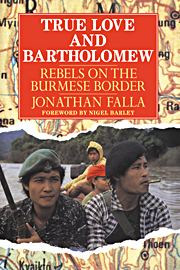Book contents
- Frontmatter
- Contents
- List of illustrations
- Foreword
- Preface
- Acknowledgments
- 1 A bronze drum
- 2 Boar Tusk's children
- 3 White collar Flowerland
- 4 True Love at home
- 5 Water child, land child
- 6 A simple man
- 7 Fighting mean, fighting clean
- 8 Great Lake and the Elephant Man
- 9 Bartholomew's boarders
- 10 The three seasons
- Interlude: from the Kok river
- 11 Last of the longhouses
- 12 A delicate bamboo tongue
- 13 True Love in love
- 14 Fermented monkey faeces
- 15 Perfect hosts
- 16 Old guard, young Turks
- 17 True Love and White Rock
- 18 Insurgents in a landscape
- 19 True Love and sudden death
- 20 Portraits
- Notes
- Bibliography
- Index
Preface
Published online by Cambridge University Press: 28 October 2009
- Frontmatter
- Contents
- List of illustrations
- Foreword
- Preface
- Acknowledgments
- 1 A bronze drum
- 2 Boar Tusk's children
- 3 White collar Flowerland
- 4 True Love at home
- 5 Water child, land child
- 6 A simple man
- 7 Fighting mean, fighting clean
- 8 Great Lake and the Elephant Man
- 9 Bartholomew's boarders
- 10 The three seasons
- Interlude: from the Kok river
- 11 Last of the longhouses
- 12 A delicate bamboo tongue
- 13 True Love in love
- 14 Fermented monkey faeces
- 15 Perfect hosts
- 16 Old guard, young Turks
- 17 True Love and White Rock
- 18 Insurgents in a landscape
- 19 True Love and sudden death
- 20 Portraits
- Notes
- Bibliography
- Index
Summary
Down the long spine of hills that divides Thailand from Burma lies a string of independent states unrecognised by any government except each other's – and most certainly not by the government in Rangoon, against whom they are rebelling. These are the enclaves of Burma's insurgent ethnic minorities, the Kachin, Karen, Wa, Shan and others, together with the outlawed Burma Communist Party and, over on the western border with India, the Arakanese and Chin. The Burmese government says that it is currently facing thirty-three separate rebellions; some of these, notably those of the Communists and the Karen, have dragged on since the late 1940s–four decades of forest warfare.
Of all these insurgent peoples, the Karen have long held a special place in European and North American affections, since well before the present troubles began. This is partly because of dramatic successes by American Baptist Missionaries in the nineteenth century, giving rise to the idea of the Karen as a chosen people waiting to be liberated by the ‘white younger brother’ of their own prophecies. But there were other factors. The Karen have on several occasions fought and died in support of the British, most remarkably in the Second World War, when their suffering and resilience impressed their colonial masters. Besides which, visitors have rarely failed to be delighted by their generosity and openness, and to be surprised by their sheer numbers. Possibly 4 million people may be regarded as Karen (the estimates, and the criteria, vary widely).
- Type
- Chapter
- Information
- True Love and BartholomewRebels on the Burmese Border, pp. xv - xxiPublisher: Cambridge University PressPrint publication year: 1991



